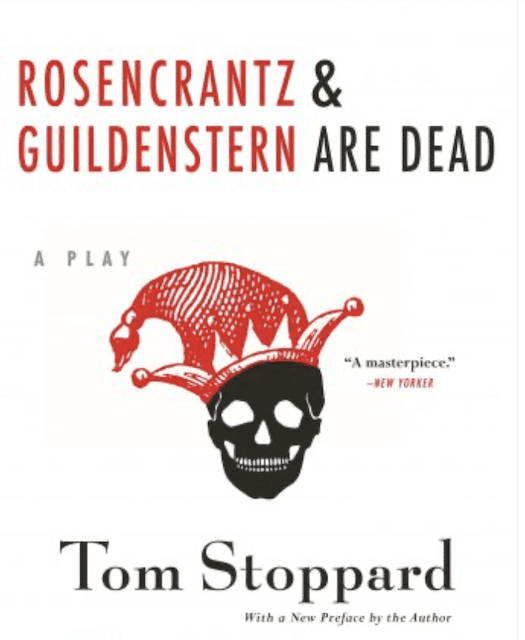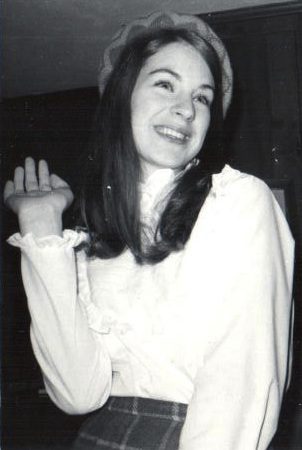Opposite: adjective, noun, adverb, preposition. Let’s take a look at the noun in a play, Tom Stoppard’s Rosencrantz and Guildenstern are Dead.

Actors: the opposite of people
“We’re actors – we’re the opposite of people!” states The Player in Tom Stoppard’s absurdist tragicomedy. Life is random for Stoppard’s lead characters, who in the opening scene flip coins and bet on tosses that always come up heads. Adding to the absurdity throughout the play, random characters arrive on stage and perform mute actions or deliver ambiguous speeches then exit.
Rosencrantz and Guildenstern banter and quip, at times rifting on the Lord’s Prayer: “Give us this day our daily cue.” Our desire for certainty. “Give us this day our daily mask.” Our desire for protection. “Give us this day our daily week.” Our desire for more time.
More often Rosencrantz and Guildenstern express confusion and distress, and rightly so. They are actors trapped in a play-within-a-play, Shakespeare’s Hamlet.
Actors – the opposite of people. Not human. The Player recognizes this immediately.
“What are you playing at?” Rosencrantz asks Guildenstern.
“Words, words. They’re all we have to go on,” Guildenstern says.
Words. All they have to go on. Rosencrantz and Guildenstern have no clear memory of the past, no idea what is happening in the present, no free will, and no clear identity. In fact, they often don’t know their own names or confuse one for the other.
Legalism and licentiousness: the opposite of grace
“Some Christians, fearing punishment, become legalists, following every jot and tittle of the ‘law.’ Others, at the opposite extreme, reject the notion of a rule-giving God completely—they perceive the commandments and other parts of the Bible as old-fashioned and unnecessary. God just wants us to be happy!” From Kerry Larson Luddy’s Ten Commandments for the Curious

These days, I smile at Rosencrantz and Guildenstern’s witty puzzlements, remembering my wordy existential teens in the 60s—Stoppard’s play dates from 1966. Discussions about faith did not satisfy me, an atheist back then. In this, I was like the playwright’s anti-existential actors: responsible for what happened without the benefit of higher laws or traditions. And all too attracted to the idea of “doing my own thing,” not realizing the choice I was making. A choice Rosencrantz and Guildenstern do not have, because as actors in a play, they have no free will.
The play-actors are so at sea, literally and metaphorically, that at one point they consider suicide. In the third act, while on the boat to England, Rosencrantz says, “I wish I was dead.” He peers into the sea. “I could jump over the side. That would put a spoke in their wheel.”
“Unless they’re counting on it,” Guildenstern says.
Rosencrantz steps back. “I shall remain on board. That’ll put a spoke in their wheel.”
They know a decision either way will make no difference. Their destinies are sealed. The last scene, taken directly from Hamlet, the ambassador from England announces: “Rosencrantz and Guildenstern are dead.”
Unbelief: the opposite of faith
“He [God] knows we need him—the only wise God (Jude 1:25, KJV)—because our hearts are wayward. To be wayward is to follow one’s own wanton inclinations, to follow no clear principle or law, to do the opposite of what’s expected or desired.” From Kerry Larson Luddy’s Ten Commandments for the Curious
Like Rosencrantz and Guildenstern, our destiny on this earth is sealed: in our last scene, we will die. But our destiny after death depends on whether we embrace the obedience of faith or the waywardness of free will. In fact, that life decision, either way, makes all the difference.

I think about Alistair Begg’s powerful lesson, “The Man on the Middle Cross,” and the two thieves caught in a series of events, stripped of everything except free will. Without masks, they had the opportunity to face themselves anew. And to turn their hearts to Jesus, the Man on the middle cross.
In Luke 23:39-43, we read that one chose to mock Jesus, to see the cross as proof that Jesus was no savior, to go along with the crowd. The other saw his own guilt and the innocence of the man on the middle cross. That man asked to be remembered not for what he had or hadn’t done—for the thief was being justly punished—but because of who He was: the Messiah.
Jesus replied, “Truly I tell you, today you will be with me in Paradise.”
Eternal life. But only if we cast off our masks and turn our wayward hearts to Him. The opposite of acting, the opposite of legalism and licentiousness, the opposite of unbelief. Faith in Him, the most fundamental decision in life.
Linkup with Five Minute Friday.



Interesting.
I had forgotten all about Rosenkrantx and Guldenstern,
P.S. I still am unable to leave likes on your posts—not even when reading on my cell phone,
Thanks! -C.D.